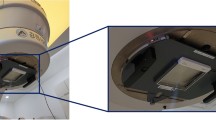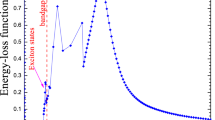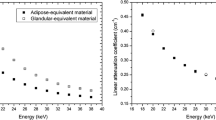Abstract
THE calorimetric system developed in the International Atomic Energy Agency (IAEA) Laboratory, Vienna, has been used for measuring the electron dose distribution in a ‘Lucite’ phantom. It may be recalled that the calorimeter1 is calibrated in rads (1 rad =100 ergs/g) by accurate determination of the electric energy input.
This is a preview of subscription content, access via your institution
Access options
Subscribe to this journal
Receive 51 print issues and online access
$199.00 per year
only $3.90 per issue
Buy this article
- Purchase on Springer Link
- Instant access to full article PDF
Prices may be subject to local taxes which are calculated during checkout
Similar content being viewed by others
References
Genna, S., Jaeger, R. G., Nagl, J., and Sanielevici, A., Atomic Energy Rev., 1, No. 4, 239 (I.A.E.A., Vienna, 1963).
Schinz, H. R., and Wideröe, R., Acta Radiologica, 37, 374 (1952). See also Wideröe, R., Fortschritte Gebiet Roentgenstrahlen und Nuklearmedizin, 95, 2, 261 (1961).
Author information
Authors and Affiliations
Rights and permissions
About this article
Cite this article
NAGL, J., SANIELEVICI, A. & WIDERÖE, R. Calorimetric Dose Measurements with 35-MeV Betatron Electron Radiation. Nature 203, 632–633 (1964). https://doi.org/10.1038/203632a0
Issue Date:
DOI: https://doi.org/10.1038/203632a0
This article is cited by
-
The Global Experiment: How the International Atomic Energy Agency Proved Dosimetry to Be a Techno-Diplomatic Issue
NTM Zeitschrift für Geschichte der Wissenschaften, Technik und Medizin (2022)
Comments
By submitting a comment you agree to abide by our Terms and Community Guidelines. If you find something abusive or that does not comply with our terms or guidelines please flag it as inappropriate.



